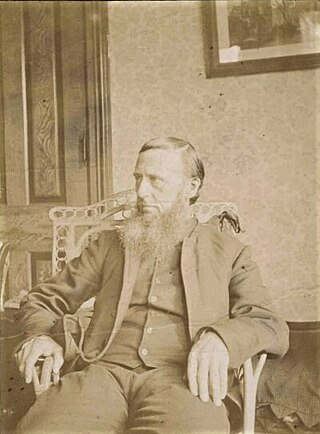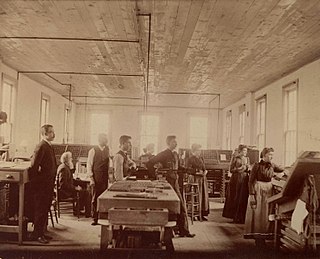Related Research Articles
The Rosedale Network of Churches is a Christian body of Mennonite churches in the Anabaptist tradition. Rosedale Network of Churches was originally formed in 1910 by a group of Amish Mennonites to promote unity while preserving autonomy of the local congregation.
Peace churches are Christian churches, groups or communities advocating Christian pacifism or Biblical nonresistance. The term historic peace churches refers specifically only to three church groups among pacifist churches:
Old Order Mennonites form a branch of the Mennonite tradition. Old Order are those Mennonite groups of Swiss German and south German heritage who practice a lifestyle without some elements of modern technology, still drive a horse and buggy rather than cars, wear very conservative and modest dress, and have retained the old forms of worship, baptism and communion.
The Mennonite Historical Library (MHL) is considered the world's most prominent and complete collection of resources and artifacts pertaining to Mennonites and related Anabaptist groups. It is housed in the Harold and Wilma Good Library on the campus of Goshen College in Goshen, Indiana. The specialty library was founded in 1906 under the guidance of Harold S. Bender and Ernst Correll. Elizabeth Miller is the current director.
John A. Hostetler was an American author, educator, and scholar of Amish and Hutterite societies. Some of his works are still in print.

John Fretz Funk was a publisher and leader of the Mennonite Church. Funk published the Herald of Truth from 1864 until 1908 when it merged with the Gospel Witness to form the Gospel Herald. Jacob Clemens Kolb, in his preface to Bless the Lord, O My Soul quotes an unnamed commentator who said, "John F. Funk is the most important [Mennonite] man after Menno Simons."
The gospel song Palms of Victory, also called "Deliverance Will Come", and "The Way-worn Traveler", appears to have been written in 1836 by John B. Matthias, a Methodist Episcopal minister in New York State. This attribution is not well documented, and Matthias had no known history of songwriting, but there is no other author to whom it can be attributed.
Conservative Mennonites include numerous Conservative Anabaptist groups that identify with the theologically conservative element among Mennonite Anabaptist Christian fellowships, but who are not Old Order groups or mainline denominations.
The Mennonite Church USA Archives was founded in 2001 under the denominational merger of the (old) Mennonite Church and the General Conference Mennonite Church. Prior to 2001, the two largest Mennonite denominations maintained separate archives: the Archives of the Mennonite Church, located on the Goshen College campus, housed materials pertaining to the (old) Mennonite Church, while the Mennonite Library and Archives on the Bethel College campus held the records of the General Conference Mennonite Church.
Peter J. Dyck was a Canadian Mennonite relief worker and pastor best known for his work resettling Russian Mennonite refugees after World War II.
The Heralds of Truth is a religious Organization founded by Daniel Milland Okitoi in 2023. It is the first periodical of the Soroti Church (SC) and was also presented to Deng Garang in Nyumanzi Refugee Settlement as the Heralds of Truth during Global Youth Week of Prayer. Milland presented the Heralds through Deng Garang Kuir of Nyumanzi, Block B,in 2024, when Milland's own company, Daniel Milland Okitoi & Deng Garang (later left the work to Youth, The Adventists in Nyumanzi took over the work in Nyumanzi, in all Blocks. The work was left to the Adventists Youth and Church Board at large in 2024.
The Women's Missionary and Service Commission, previously known as the Women's Missionary and Service Auxiliary and abbreviated WMSC or WMSA, was a women's organization of the "old" Mennonite Church that originated out of the Mennonite Sewing Circle movement. Named the WMSC in 1971, there were many precursor organizations and it has since evolved into Mennonite Women USA, an organization with a much wider scope.
George Jay Lapp was an American missionary to India for the Mennonites. He was ordained in 1905 and became a Bishop in 1928 while in India. Lapp served as interim president of Goshen College from February 1918 until June 1919.
Nelson Edward Kauffman was an American religious leader who served as a bishop and pastor of the (old) Mennonite Church. He served as secretary for home missions for the Mennonite Board of Missions and Charities from 1955–1970, as president of the Mennonite Board of Education from 1950–1970, and from 1934–1956 worked with his wife, Christmas Carol Kauffman, as a missionary in Hannibal, Missouri. He is father of James Kauffman.

Lucy Winchester is a novel by Mennonite author Christmas Carol Kauffman. It is a semi-biographical adaptation of the life of Bessie Viola Lain, published in 1945 by Herald Press, a Mennonite publishing house.

The Mennonite Publishing Company was a publishing agency in Elkhart, Indiana, operating primarily from 1875-1908, which under John F. Funk served as the main source of published material for the (old) Mennonite Church. The Mennonite Publishing Company was the third and final agency through which Funk published a great deal of historical and denominational Mennonite texts and periodicals, having previously published as "John F. Funk" from 1864-1869 and "John F. Funk and Brother" from 1869-1874.
The Mennonite Publication Board was founded in 1908 in Scottdale, Pennsylvania, as an organization through which the (old) Mennonite Church could own and operate its own publishing and periodicals. It served as the overseeing board for the printing and sale of denominational texts, operating the Mennonite Publishing House in Scottdale along with several bookstores throughout the United States and Canada, until 2002.
Gospel Herald was the official publication of the Mennonite Church from 1908–1998. It was formed from a merger of Gospel Witness and Herald of Truth. As part of the merger of the Mennonite Church and the General Conference Mennonite Church, Gospel Herald merged with The Mennonite of the General Conference Mennonite Church to form a new periodical titled The Mennonite.

John Horsch was a Mennonite historian and writer.
The Mennonites in Maryland maintain a small population dating back over a century. The majority of Maryland's Mennonites live in Southern Maryland or on the Eastern Shore, while smaller Mennonite communities exist in Grantsville, Baltimore, Howard County, and elsewhere scattered throughout the state.
References
- ↑ Hostetler, John A. (1958). God Uses Ink. Scottdale, PA: Mennonite Publishing House.
- ↑ "Gospel Herald (periodical)". Global Anabaptist Mennonite Encyclopedia Online. Retrieved 19 January 2016.
- ↑ "Digital Mennonite Periodicals" . Retrieved 19 January 2015.
- ↑ "Mennonite Publishing House". Archived from the original on 2013-02-12.
This article needs additional or more specific categories .(April 2024) |